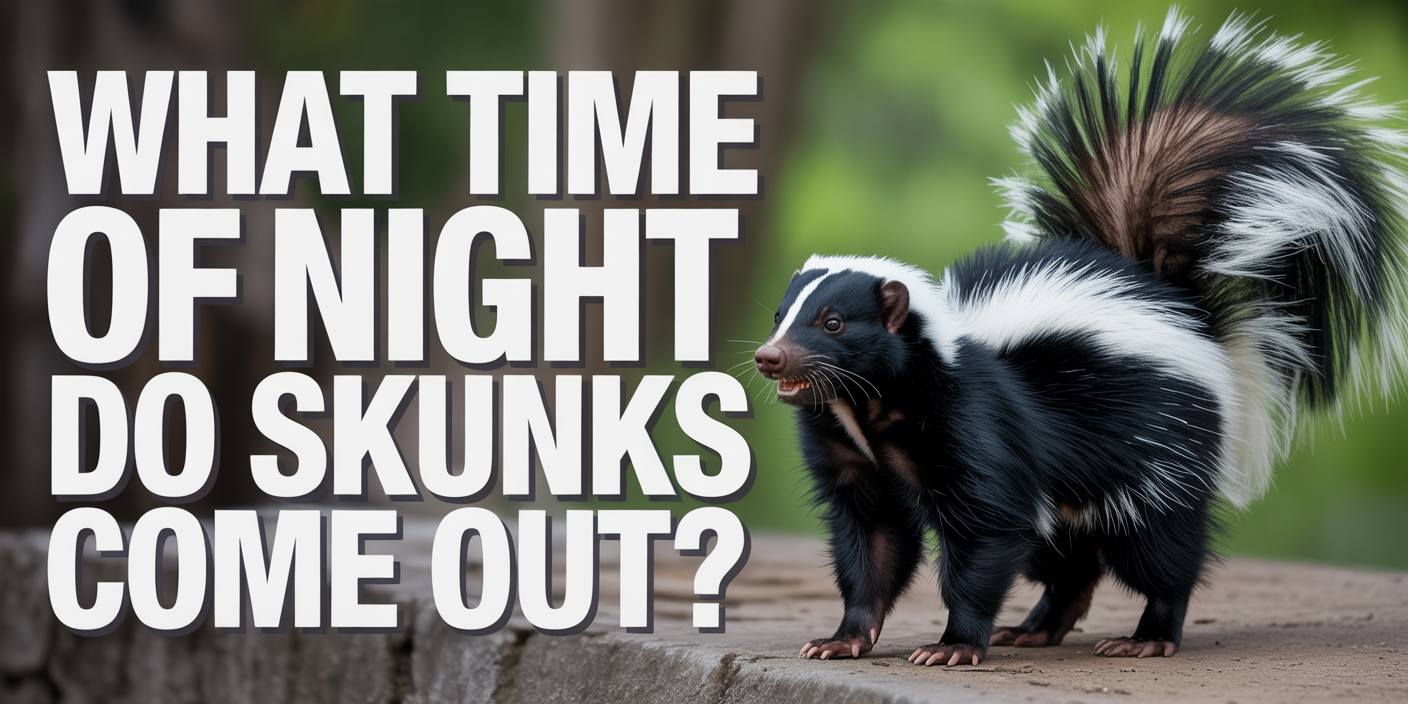Skunks usually come out shortly after sunset, between 8:00 PM and 10:00 PM. This is when they begin foraging for food under the cover of darkness.
If you’ve ever caught a whiff of that unmistakable skunk smell at night, you’re not alone. These striped nocturnal roamers tend to make their rounds once the sun goes down, and knowing exactly when can help you avoid an unpleasant surprise in your yard.
Learn more: What is the best homemade skunk repellent?
What Time of Night Do Skunks Usually Come Out?
Skunks typically begin their nightly activity shortly after sunset, around 8:00 PM to 10:00 PM depending on the season. As nocturnal animals, they prefer the cover of darkness for foraging, scavenging, and exploring.
Their internal clock is tied to light levels, so longer summer evenings might delay their appearance, while in colder months, they may emerge earlier to maximize their limited active time. Understanding this timing helps homeowners identify when skunks are most likely to be on the move around their property.
Why Do Skunks Come Out at Night?
Skunks are nocturnal by nature, meaning they rely on the night to search for food while staying hidden from predators. Darkness gives them an edge, helping them avoid larger animals and human activity while they dig for grubs, raid trash bins, or hunt insects.
Their nighttime habits are also driven by temperature and moisture; cooler, damp nights make it easier to find worms and other prey. This behavior makes them especially active just after dusk when conditions are still comfortable and food sources are plentiful.
Do Skunks Stay Out All Night?
Skunks usually remain active for several hours after emerging, often until the early morning hours around 2:00 AM to 4:00 AM. During this time, they roam neighborhoods, woodlands, and yards in search of food, mates, or shelter.
Their nightly schedule can vary depending on factors like the season, food availability, and breeding cycle. In winter, they may limit their activity to just a short period, while in warmer months, they might stay out longer and travel farther from their dens.
How to Tell If Skunks Are Visiting at Night?
If skunks are hanging around your property at night, you’ll often notice subtle clues the next morning. Look for small holes in your lawn from digging, knocked-over trash cans, or that distinct musky odor lingering in the air.
You might also hear light rustling or shuffling sounds near sheds, decks, or crawl spaces after dark. Using motion-activated cameras or checking for paw prints and droppings can help confirm if these nighttime guests are skunks.
Is It Dangerous If You See a Skunk at Night?
Seeing a skunk at night isn’t automatically dangerous, as most are shy and non-aggressive. However, they will spray if they feel cornered or threatened, and a startled reaction, like yelling or moving quickly, can trigger their defense.
There’s also a small risk of rabies, especially if the skunk is acting strangely, like staggering or being unusually active during the day. In any case, it’s best to keep your distance and avoid interaction, even if the animal seems calm.
How to Keep Skunks Away from Your Property at Night
The best way to keep skunks from visiting at night is to remove the things that attract them. Secure your trash cans, bring in pet food, and clean up fallen fruit or compost that might tempt a hungry skunk to stop by.
You should also block access to dark, quiet spaces where skunks might want to den, like under decks, sheds, or porches. Motion-activated lights, natural repellents, and fencing can also help, but if they’re already nesting nearby, it’s time to call a wildlife removal expert like AAAC Wildlife Removal.
Timing Matters for Skunk Prevention
Knowing that skunks typically come out between 8:00 PM and 10:00 PM gives you a clear window to take precautions before they start roaming. Simple actions like securing food sources and sealing off entry points can make your property less inviting before nightfall.
If you’re consistently spotting or smelling skunks after dark, don’t wait for the situation to escalate. Calling in a professional like AAAC Wildlife Removal ensures the problem is handled safely, humanely, and without the stink.
Need Help with Skunks? We’ve Got You Covered.
Don’t let nighttime skunk visits turn into a stinky situation. Our experts at AAAC Wildlife Removal specialize in safe, humane skunk removal and prevention strategies that keep your property protected.
Contact AAAC Wildlife Removal today and reclaim your yard, before the next spray!




